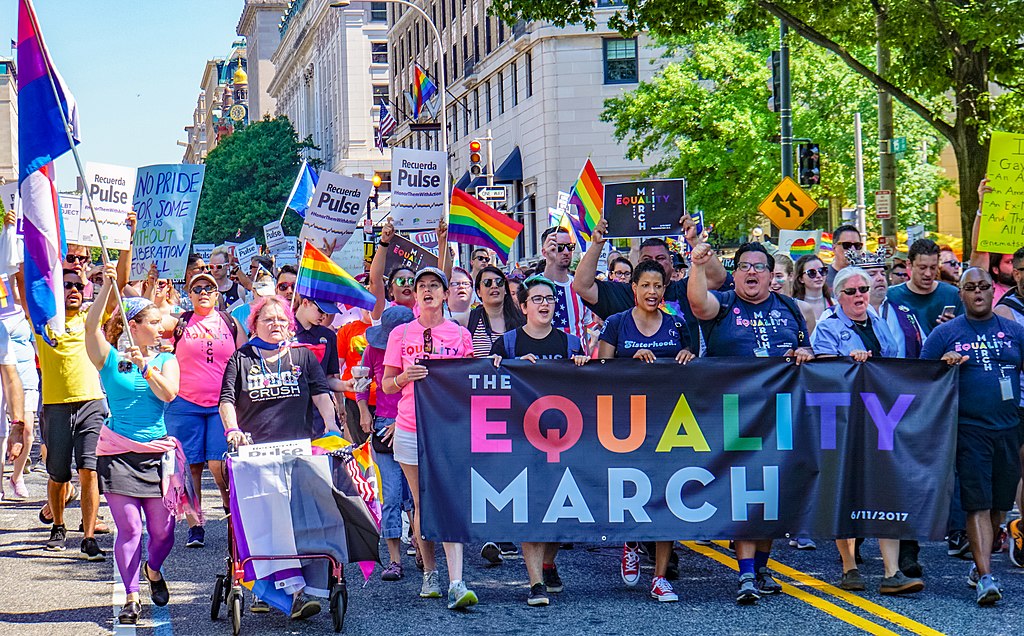Gordie Felger is a volunteer member of two LGBTQ+ organizations (CR Pride and Free Mom Hugs) and a One Iowa volunteer activist. He is a friend of many LGBTQ+ folks and an ally to the community. He also writes about the state of Iowa politics at “WFT Iowa?”
Do you have an LGBTQ+ person in your life? Are you an ally? How do you know? Who determines allyship? What does allyship look like?
These are all important questions. But there is no single correct answer. Allyship depends on your relationship with those you know and love. It takes many forms. The allyship of a parent looks different than that of a friend, co-worker, or classmate. Regardless, all types of allyship matter to those around you.
It’s important to understand you can’t declare yourself an ally. The people you interact with decide whether you deserve that label. It takes work to earn a reputation as an ally, but your efforts will be noticed and appreciated.
So, what does it take to be an ally? Here’s a useful—though not exhaustive—list of actions.
- Admit you don’t know everything and be willing to learn. Learn the language, history, and culture of the LGBTQ+ community. Keep learning, then pass that knowledge on.
- Research what you don’t know first. If you still don’t understand, ask. Just don’t expect a loved one or friend to know everything or to speak on behalf of all LGBTQ+ people.
- Show up. Attend or volunteer at LGBTQ+ community events. Show that you want to be a supportive part of the community.
- Ask, “How are you doing?” Attacks on LGBTQ+ people take an emotional toll on everyone in the community. Show you care by asking the question, then listening with empathy.
- Be flexible. If someone you love wants to use a different name or pronoun set, go with it. Respecting their wishes shows respect for them.
- If someone comes out to you, realize the courage and the trust in you that that act took. Respond to that courage and trust with love, support, and compassion. It’s OK to work through your feelings, but do that on your own time.
- Know your biases. Ask yourself why you feel uncomfortable around some people. Where did your biases come from? Why do you carry them with you? You may realize they don’t make sense. Use that self-reflection to change your words and actions.
- Think before you speak. You may make mistakes, but keep trying. Don’t be defensive when corrected. Instead, say, “Thank you. I’ll do better next time.”
- Don’t assume. Get in the habit of using gender-neutral language. For example, say “child” instead of “daughter” and “they” instead of “she.”
- Introduce yourself with your pronoun set to help others feel comfortable sharing their pronouns. This habit normalizes the practice. For example, I say, “My name is Gordie. I use he/him pronouns.” If you feel comfortable doing so, also include your pronoun set in your email signature.
- Wear LGBTQ+-identifying clothes and accessories in public to show you’re a safe person.
- Be visible and vocal. Write editorials, speak in public, attend rallies. Silent allyship is not allyship.
- Get political. So many politicians spread bigotry and ignorance. Those entrusted to defend our rights instead strip them away. Do what you can to replace politicians with true leaders who protect our rights. Vote, campaign, donate money, volunteer, sign a petition, run for office, make your voice heard. Know that your actions make a difference.
The expression “Allyship is a verb” means that it takes ongoing action to be an ally. What form that action takes is up to you.
“We’re all allies,” says Corey Jacobson, president of CR Pride. He was referring to anyone who furthers the Pride movement, regardless of sexual orientation or gender identity. Allyship binds together everyone who cares enough to act. You, too, can be a part of the community by being an ally.
Top photo of Equality March in Washington, DC on June 11, 2017, is by Ted Eytan and available via Wikimedia Commons.


2 Comments
surely one can be an ally to a community without any direct interactions with that community
lovely to take care in treating people how they want to be treated (no way to really know this without asking them) when possible but if we don’t get Democrat elected officials in the congress (and perhaps in statehouses if it comes to Governors just ignoring court decisions) to expand the Supreme Court (and or remove some of the current Justices) more and more people will be stripped of their civil rights and open to all kinds of abuse and even deaths.
dirkiniowacity Thu 4 Jan 2:16 PM
bearing witness
lovely remembrance of the lesbian poet and activist Minnie Bruce Pratt
https://www.poetryfoundation.org/podcasts/161811/poets-we-lost-in-2023
dirkiniowacity Thu 4 Jan 5:06 PM